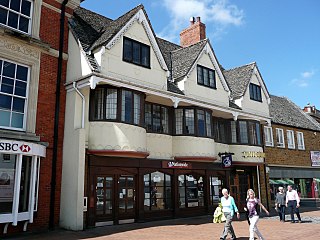
A building society is a financial institution owned by its members as a mutual organization, which offers banking and related financial services, especially savings and mortgage lending. They exist in the United Kingdom, Australia and New Zealand, and formerly in Ireland and several Commonwealth countries, including South Africa as mutual banks. They are similar to credit unions, but rather than promoting thrift and offering unsecured and business loans, the purpose of a building society is to provide home mortgages to members. Borrowers and depositors are society members, setting policy and appointing directors on a one-member, one-vote basis. Building societies often provide other retail banking services, such as current accounts, credit cards and personal loans. The term "building society" first arose in the 19th century in Great Britain from cooperative savings groups.
Washington Mutual, Inc. was an American savings bank holding company based in Seattle. It was the parent company of WaMu Bank, which was the largest savings and loan association in the United States until its collapse in 2008.

Northern Rock, formerly the Northern Rock Building Society, was a British bank. Based at Regent Centre in Newcastle upon Tyne, United Kingdom, Northern Rock was originally a building society. It demutualised and became Northern Rock bank in 1997, when it floated on the London Stock Exchange with the ticker symbol NRK.

The Co-operative Bank plc is a British retail and commercial bank based in Manchester, England. Established as a bank for co-operators and co-operatives following the principles of the Rochdale Pioneers, the business evolved in the 20th century into a mid-sized British high street bank, operating throughout the UK mainland. Transactions took place at cash desks in co-op stores until the 1960s, when the bank set up a small network of branches that grew from 6 to a high of 160. Branches for residents of the Isle of Man and the Channel Islands were closed in the 2010s during a significant rescaling exercise. As of 2023 it has 50 branches in the UK.

Permanent TSB Group Holdings plc, formerly Irish Life and Permanent plc is a provider of personal financial services in Ireland. Irish Life Assurance plc and the Irish Permanent Building Society merged to form the Irish Life and Permanent Group in 1999 and the merged entity acquired the Trustee Savings Bank in 2001. The group has no connection to the UK's TSB Bank.

Allied Irish Banks, p.l.c. is one of the so-called Big Four commercial banks in the Republic of Ireland. AIB offers a full range of personal, business and corporate banking services. The bank also offers a range of general insurance products such as home, travel and car. It offers life assurance and pensions through its tied agency with Irish Life Assurance plc.

EBS d.a.c. is a small financial institution in Ireland registered as a designated activity company.
Bristol & West (B&W) was a former mutual building society in the United Kingdom (UK), one of the first to be demutualised to become a publicly traded bank in 1997. Bristol & West had its headquarters in Bristol, England, UK. B&W became a division of the UK arm of the Bank of Ireland in 1997.

The Britannia Building Society was founded as the Leek & Moorlands Building Society in Leek in 1856. It expanded steadily as a regional society until the late 1950s when it began a major expansion drive, partly through branch openings but also some 55 acquisitions. The most substantial of these were the NALGO Building Society in 1960; the Westbourne Park in 1965 ; and the Eastern Counties Building Society in 1974. The Society’s name was changed to the Britannia Building Society the following year.
The Portman Building Society was a mutual building society in the United Kingdom, providing mortgages and savings accounts to consumers and offering loans to commercial enterprises. Its head office was in Bournemouth and its administration centre in Wolverhampton. Portman merged with the Nationwide Building Society in August 2007, at which time it was the third largest building society in the UK and the largest regional building society in the south of England, with 154 branches and assets exceeding £15 billion.

Cooperative banking is retail and commercial banking organized on a cooperative basis. Cooperative banking institutions take deposits and lend money in most parts of the world.
Norwich & Peterborough Building Society (N&P) is a trading name of Yorkshire Building Society based in Bradford, West Yorkshire. Formed by the merger of the Norwich and Peterborough building societies in 1986, at the time of merger with YBS, it was the ninth largest building society in the United Kingdom, with assets in excess of £4.9 billion.

The Coventry Building Society is a building society based in Coventry, England. It is the second largest in the United Kingdom with total assets of more than £62 billion at 31 December 2023. It is a member of the Building Societies Association. The society has over 1.6 million saver-members and a further 460,000 borrower-members.
The Dunfermline Building Society was a building society and later a trading division of Nationwide Building Society, based in Dunfermline, Scotland. Before its 2009 merger with Nationwide, it was the largest building society in Scotland and the 12th largest in the United Kingdom based on total assets of £3.3 billion at 31 December 2007. It was a member of the Building Societies Association.
The City of Derry Building Society was a UK building society based in Derry, County Londonderry, Northern Ireland, known until 2001 as the Londonderry Provident Building Society. It was a member of the Building Societies Association.
In the period September 2007 to December 2009, during the events now widely known as the Global Financial Crisis, the UK government enacted a number of financial interventions in support of the UK banking sector and four UK banks in particular.

Santander UK plc is a British bank, wholly owned by the Spanish Santander Group. Santander UK plc manages its affairs autonomously, with its own local management team, responsible solely for its performance.
Michael Fingleton is a former chief executive of Irish Nationwide Building Society. He joined the building society in 1971 and retired in April 2009 as the effects of the 2008–2012 Irish banking crisis became apparent. He is known as "Fingers" in the banking community.

TSB Bank plc is a British retail and commercial bank based in Edinburgh, Scotland. It has been a subsidiary of Sabadell Group since 2015.

Starling Bank is a British bank, occasionally referred to as a digital challenger bank or neobank, providing current and business bank accounts in the United Kingdom. Starling Bank is a licensed and regulated bank, founded by former Allied Irish Banks COO, Anne Boden, in January 2014. Since its founding, it has received over £500M of funding.












